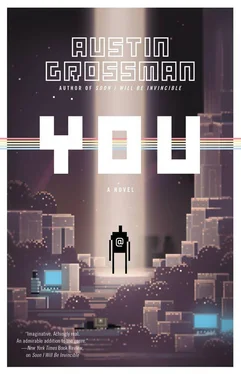“And there were no graphics, just spreadsheets on what the market was doing, price fluctuations, and… you know. And then we just let the sim run.
“We gave it a title screen like GLOBAL FUTURES MARKET ALGORITHM GENERATOR. But if you open up the code, it’s all elves and dwarves, a couple of good and evil wizards playing the federal agencies, who stepped in if things skewed too far. The actual thing that made the calls for them? A modded version of the semidivine necromancer Boris, wearing a plus-four Ring of Cunning and a Mild Prescience Aura. Brutal, brutal hack.
“And you know what? It wasn’t the worst thing in the world. It basically did rational things. It was like everything Simon did on that engine. God, he was smart.”
“Did they make money?” I asked.
“I have no idea. They talked about using it in the Hong Kong market, but this was right in October of eighty-seven—Black Monday, remember?”
I did, the same way I remembered Walter Mondale running for president.
“A stock market crash.”
“A pretty big one. They lost their money, or so we assumed. We didn’t care—they were laughing at us the whole time anyway. It was like doing business with Biff from Back to the Future . We never heard from them again.”
“So you never found out if it worked?”
“It was a nice little system, and it had a logic to it, just the way the game does, but who knows if it worked in reality? Darren walked away with ten thousand dollars and put it all into revamping Realms III for the commercial version. That’s how we seeded Black Arts.”
In the final reckoning, Tomb of Destiny got a C plus because it was buggy and, as a piece of code, it didn’t solve even its reasonably simple problems elegantly, but it was not a terrible game when you got used to the lack of graphics. More than once, I played until two in the morning, and after a while the &s and +s and all the letters and numbers fell away and it was all the same to me, like looking through the black screen and glowing letters to a darker, hidden place—daemons and sepulchral stone chambers and stairways and landings corkscrewing down into the earth. Maybe the story wasn’t complicated, but maybe “downward” was all the story I needed just then, simple and elementally real. I tapped forward grid point by grid point, braced for the next horror to spring out at me in the form of some friend or foe. All you know is to go downward from stair to stair, down into the unknown, in spite of the dangers, keystroke by keystroke, further into the data. I delved into the substanceless phosphorescent earth for that priceless treasure, always elusive, the transcendent loot of memory.
On April 14, Darren Ackerman, lead designer and legitimate game-industry legend, quit. He came in at eleven and spent maybe twenty minutes in Don’s office, and then walked through the empty office, ponytail bouncing briskly, past the Excellence in Game Design awards, past the cubicle maze, past the testers playing split-screen Mario Kart in the conference room, past the life-size cutout of a man wielding an ergonomically impractical sword, and out of the building forever, past the two shaggy guys still porting Solar Empires III to Mac.
I watched him Frisbee his security card far out into the weeds, get in his signature Rolls-Royce, and drive away. About twenty minutes later, Don sent a company-wide e-mail explaining that over the weekend Darren had “chosen not to continue his journey with us.”
Twenty minutes after that, another e-mail came with a list of fourteen other employees who were also not making said journey. Most of them I didn’t know, but the employee directory put them as nearly all the senior design and programming staff. It seemed that Darren had taken his pick of the developers before he left. He must have been arranging it for weeks. He didn’t take Lisa.
A few minutes later I got a private e-mail from Don asking me to come talk to him in his office.
His door was ajar, but I knocked anyway. No one at Black Arts would wear a tie, but Don wore the nearest equivalent, the scaled-back management uniform of blue button-down shirt with khakis, the shirt bulging in the middle a little and giving him the overall look and feel of a Best Buy employee. He looked uncomfortable, as if I were trying to return a copy of Quake II after the ninety-day deadline without a receipt.
He owned part of the company, but I couldn’t tell if that made him rich or not. I was starting to realize how little I knew about how Black Arts worked.
“Hi, Don.”
“Hey, Russell.”
Everything at Black Arts was so purposely informal that when actual business conversations had to happen they became ten times as uncomfortable. Or else maybe people came to Black Arts because they were innately terrible at this kind of thing.
“How are you liking it here so far?” he asked. Uh-oh.
“It’s—it’s really great,” I said. “I’m pretty much trained up on existing tools, just waiting for the new engine to happen.”
“Okay, good, great.” Don sighed—not like I’d passed a test; more like I’d left him no way out.
“So, this weekend…” he began. Was I really being fired? I had never been fired, not even from a job taking tickets at the box office of a summer-stock theater over an exquisitely lonely summer on Cape Cod—not even after drunkenly losing half a night’s receipts.
“This weekend the company was sold to Focus Capital. It was a decision between Darren and myself. Darren holds—held—a majority stake, which he no longer does. This is confidential, for now.”
“Okay,” I said. Did Don think I knew about things like this? Did he want advice? It looked like he hadn’t slept much. Also like one of his oldest friends had betrayed him.
“But this turned out to be part of a—maneuver—Darren had been planning, I think for some time,” Don went on. There might have been a slight quaver in his voice. “He left and took a lot of senior developers with him to a new start-up. It was perfectly legal. No one ever signed a noncompete agreement.
“I know you’re wondering where this is going. The partners at Focus are… well, they’re not too happy. They thought they were buying up the talent that was Black Arts’ principal asset, but that’s not what they got. What they have in Black Arts is a slightly rickety code base, a whole bunch of intellectual property, and game franchises. And a bunch of desks and computers and a pretty high burn rate. I’m being candid here.
“So I guess what I’m getting to is, there’s been a restructuring. The partners reviewed a lot of the personnel files and they’ve decided to ask you to take on a bigger role here. We’d like you to be design lead on Realms RPG.”
“Oh. Oh, wow. Okay. I mean, thanks,” I said. There was more, about compensation and stock options; I keep saying thanks and nodding and waiting for the meeting to be over.
“Look, can I—” he began. It’s funny that I was thinking of him as much older than I was, but it came to me that he wasn’t out of his late twenties; he was Darren’s contemporary.
“Sure. Sure. I know it doesn’t make sense. Making me that,” I told him.
“If I can be honest, design got hit a lot harder than programming. Focus doesn’t know that much about games, and I think your chess background weighed pretty heavily. I said we would do it, but to some degree it’s going to be in name only, at least until we see how you’re doing.”
“Of course! Of course,” I said. Maybe he’d hoped I was going to refuse the position, which might have been sensible.
“I’ll see you at the leads meeting Tuesday morning,” he said. “I’m looking forward to working with you.”
Читать дальше





![Ally Carter - [Gallagher Girls 01] I'd Tell You I Love You But Then I'd Have to Kill You](/books/262179/ally-carter-gallagher-girls-01-i-d-tell-you-i-lo-thumb.webp)






